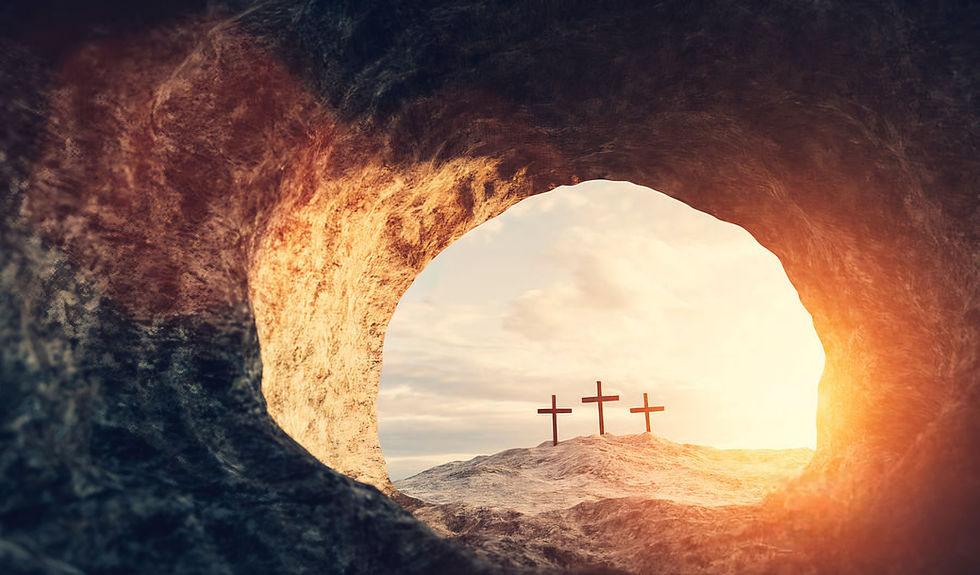The Prayers of Jesus
- Crossfire

- Apr 2, 2023
- 4 min read

We have two recorded full prayers of Jesus in the Bible. The Lord’s Prayer in Matthew 6 and Luke 11 and the prayer Jesus says to conclude his final words and encouragements to the disciples in John 17. The Lord’s Prayer is an exemplar prayer that Jesus gives us for how we should pray and approach the Father. The prayer in John 17 however, is a direct eavesdropping of the Son talking to the Father. While there are numerous references to Jesus going off to pray or returning after having been away, this is the only instance in which we are privy to the discussion. (Other than snippets of his prayer in Gethsemane, but who can blame the man for pleading for his life?) Let’s compare the two prayers and see how Jesus used the framework he gave us in his own prayers.
“Our Father in heaven, hallowed be your name,”
1 Father, the hour has come. Glorify your Son, that your Son may glorify you… 5 And now, Father, glorify me in your presence with the glory I had with you before the world began.
Jesus begins his two recorded prayers in the same way, recognizing the holiness and glory of God. (I speculate this would have been a habit for him.) He has been doing miracles and teaching, showing signs of God’s glory, for the past few years. However, Jesus is about to take his final steps to the cross and he knows this is the only remaining, and most significant, part of bringing the glory of God to the world. His request in verse five also reminds us that he is eternal and gave up significant glory to come live with us and show us God.
“Your kingdom come, your will be done, on earth as it is in heaven.”
2 For you granted [the Son] authority over all people that he might give eternal life to all those you have given him. 3 Now this is eternal life: that they know you, the only true God, and Jesus Christ, whom you have sent…20 I pray also for those who will believe in me through their message, 21 that all of them may be one, Father, just as you are in me and I am in you. May they also be in us so that the world may believe that you have sent me.
God has no greater desire for His children than that they would accept His gift of grace and live eternally with Him (2 Peter 3:9). God also makes no distinctions between sex, race, socioeconomic level, or any of the other ways we divide people today. He wants all people to come to Him through Jesus and all those people to be unified in Him. The unity we have with our brothers and sisters in Christ, even those who may not agree with us on everything (or much of anything other than Jesus), is what the world needs to see to believe in Jesus.
“Give us today our daily bread.”
6 I have revealed you to those whom you gave me out of the world. They were yours; you gave them to me and they have obeyed your word. 7 Now they know that everything you have given me comes from you. 8 For I gave them the words you gave me and they accepted them. They knew with certainty that I came from you, and they believed that you sent me.
Jesus’ prayer in John 17 uses forms of the verb “give” 13 times in reference to the Father. Most of them are things God gave to Jesus and include authority, the disciples and Christians to come, work to do, words, glory, his name, and, just in case you thought something might be missed, everything. Jesus simultaneously reminds us that God is the gracious giver of everything and that we need to be sure to acknowledge and be appreciative of these gifts.
“And forgive us our debts, as we also have forgiven our debtors.”
14…the world has hated them, for they are not of the world… 17 Sanctify them by the truth; your word is truth.
This is one of the most humbling portions of the Lord’s Prayer – asking God to forgive us in the same ways we have forgiven those who have wronged us. The list of people who need our forgiveness is long. Our family and friends who wronged us personally; the aggressive driver who almost hit us; people in the world who hate us just because we call ourselves Christians and follow Christ. Fortunately, because of the word of God and the death of Christ, we can receive forgiveness for the ways we have wronged God and can pass that grace on to others.
“And lead us not into temptation, but deliver us from the evil one.”
11 Holy Father, protect them by the power of your name, the name you gave me, so that they may be one as we are one…15 My prayer is not that you take them out of the world but that you protect them from the evil one.
Jesus specifically mentions protection and deliverance from evil and Satan in both prayers. He knows we need protection on multiple levels. First, protection from our own selves and our sinful nature. Left to our own devices, we’ll find (and sometimes even create) our own temptations and opportunities for sin and indulging the flesh. Second, Satan has no intentions of letting Christianity and God’s word spread easily throughout the world and will do whatever he can to distract Christians or discredit their message. Jesus prayed protection over the disciples and modeled it for us to pray it for ourselves. He knew we’d need it!
“For yours is the kingdom and the power and the glory forever. Amen.”
26 I have made you known to them, and will continue to make you known in order that the love you have for me may be in them and that I myself may be in them.
While this line is not a part of some of the earlier manuscripts, I find it awkward to conclude the prayer at the previous line and I’ve always enjoyed the reminder that it’s all God’s and the assurance that He wins in the end. Jesus continues to work in people today to lead them to the Father and show them His love. May we be part of that mission, loving those we walk alongside each day.



Comments